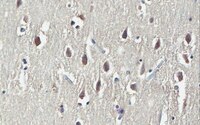MABC980 Sigma-AldrichAnti-PD-L1 Antibody, clone 29E.2A3.C6, Azide Free
Anti-PD-L1 Antibody, clone 29E.2A3.C6, Azide Free is an antibody against PD-L1 for use in Immunohistochemistry (Paraffin), Flow Cytometry, Neutralizing, Immunocytochemistry.
More>> Anti-PD-L1 Antibody, clone 29E.2A3.C6, Azide Free is an antibody against PD-L1 for use in Immunohistochemistry (Paraffin), Flow Cytometry, Neutralizing, Immunocytochemistry. Less<<MSDS (material safety data sheet) or SDS, CoA and CoQ, dossiers, brochures and other available documents.
Recommended Products
概述
| Replacement Information |
|---|
重要规格表
| Species Reactivity | Key Applications | Host | Format | Antibody Type |
|---|---|---|---|---|
| H, R, Chp | IH(P), FC, NEUT, ICC | M | Purified | Monoclonal Antibody |
| References |
|---|
| Product Information | |
|---|---|
| Format | Purified |
| Presentation | Purified mouse monoclonal IgG2bκ antibody in PBS without preservatives. |
| Quality Level | MQ100 |
| Physicochemical Information |
|---|
| Dimensions |
|---|
| Materials Information |
|---|
| Toxicological Information |
|---|
| Safety Information according to GHS |
|---|
| Safety Information |
|---|
| Packaging Information | |
|---|---|
| Material Size | 100 μg |
| Transport Information |
|---|
| Supplemental Information |
|---|
| Specifications |
|---|
| Global Trade Item Number | |
|---|---|
| 产品目录编号 | GTIN |
| MABC980 | 04055977330342 |









